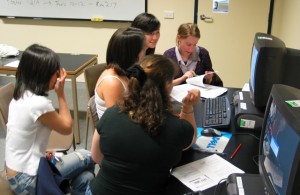Learning Approach, Course Experience, and the Self (LACES)
Phase 1 of the LACES project has been running for several years based at the ANU and the response has been very encouraging so far. Preliminary work with Professor Michael Platow and Dr. Diana Grace (Platow, Mavor and Grace, 2012), developed the idea of the reciprocal link between a deep learning approach and discipline-based social identity as an emerging aspect of the self. (initially demonstrated in Psychology students). In parallel work, Bliuc, Ellis, Goodyear, & Hendres (2011a, 2011b) similarly demonstrated the link between a deep learning approach and discipline-based social identity.
We have been building on these ideas further and in particular examining the direct and moderating role of the perceived learning norms of the group. That is, students who identify with their discipline show even more engagement in deep learning if they also perceive the group norms to favour deep learning. Similarly, students who themselves engage in deep learning are even more likely to show high levels of identification with their discipline if they perceive deep learning to be the norm. We have demonstrated this in a large online survey of around 300 ANU students from second and third year courses right across the university (Smyth, Mavor, Platow, Grace and Reynolds, in press).
Facilitating Deep Approaches to Learning and Improved Course Experience
Our current research is looking at the development of these processes over a semester, but we are also looking closely at how this work can inform better course design and teaching practice by giving feedback to course coordinators.  We have developed a collaboration with course (/unit/module) coordinators that allows us to provide much more detailed feedback about learning approaches, expectations, perceptions of teaching quality and course evaluations than would normally be possible through standard teaching evaluation processes. This sort of information is proving valuable to course coordinators as they engage in reflective practice and develop their courses, and is also invaluable for developing a teaching portfolio for career development.
We have developed a collaboration with course (/unit/module) coordinators that allows us to provide much more detailed feedback about learning approaches, expectations, perceptions of teaching quality and course evaluations than would normally be possible through standard teaching evaluation processes. This sort of information is proving valuable to course coordinators as they engage in reflective practice and develop their courses, and is also invaluable for developing a teaching portfolio for career development.
In 2012 and 2013 we worked with the coordinators of 20 different courses across the ANU, including Art History, Accounting, Computer Science, Engineering, Languages, Maths, Management, Medicine, Psychology, Political Science, and Visual Arts. In 2014 we hope to expand the project to St Andrews, and then to develop the technology to offer this valuable feedback to course leaders in other institutions.
During Phase 2 of the project, we plan to develop two pathways in which this work can benefit course leaders and lead to better learning outcomes for their students. (1) We are continuing to develop the feedback process to coordinators so that they can make helpful changes to their course structure, and  (2) we hope to develop a process of constructive identity-alignment that might help students to respond to positive deep learning norms and higher levels of engagement with their discipline to reinforce effective learning strategies. We are calling this the ASSIGN project (Aligning Self & Study, through Interaction & Group Norms).
(2) we hope to develop a process of constructive identity-alignment that might help students to respond to positive deep learning norms and higher levels of engagement with their discipline to reinforce effective learning strategies. We are calling this the ASSIGN project (Aligning Self & Study, through Interaction & Group Norms).
The LACES project is being led by Lillian Smyth and Ken Mavor (with collaboration from Michael Platow and Diana Grace). Lillian is the first contact for the project now at the ANU and course leaders at St. Andrews can get in contact with Ken for more information.